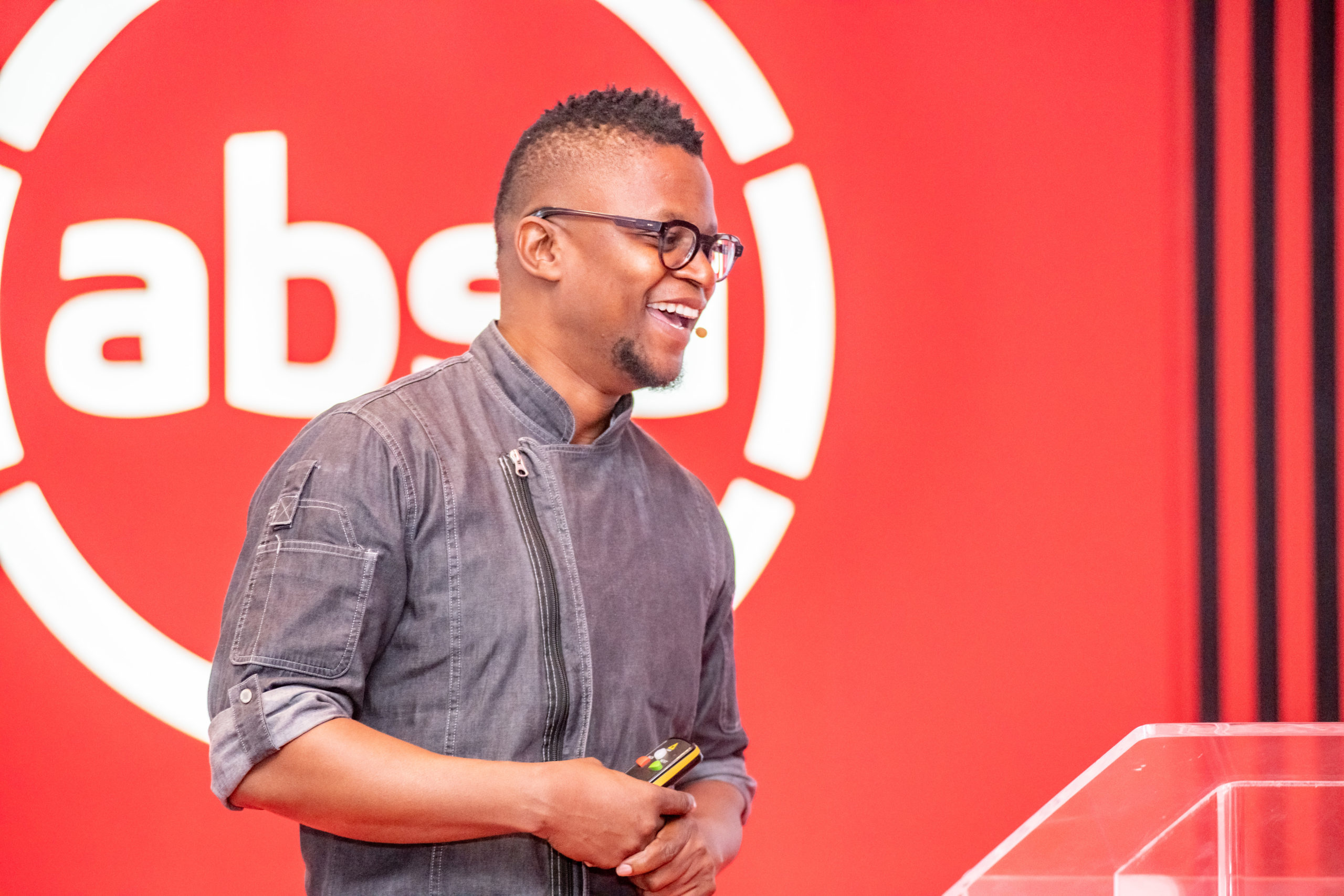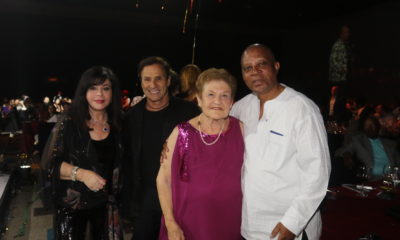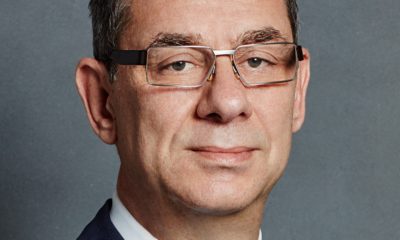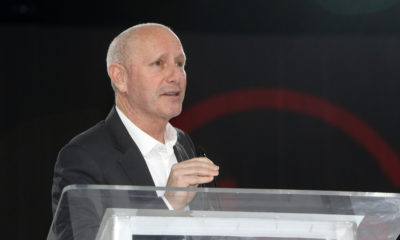
Achievers

Back to boerie – the entrepreneur who fired up a brand
There’s no “Start 101” school that teaches you how to create a business, the secret is just to start, says entrepreneur Miles Kubheka. “It’s 90% showing up, 10% when you get there.”
These may seem like pat phrases, but Kubheka has certainly showed up, building a food and beverage business up from the ground with no training in the field whatsoever. He told his extraordinary story to the Absa Jewish Achiever Awards breakfast at the Sandton Hotel on 18 November.
Unlike most businesses, which build a brand around a going concern, Kubheka started by finding a winning brand, and built a business around it. The brand was Vuyo’s, in a popular TV advert for Hansa Pilsener, which told the story of a young entrepreneur who builds a successful business from nothing, selling boerewors rolls.
Kubheka, then working in IT at Microsoft, first believed that the advert was based on a real person called Vuyo, but after he realised it was pure fiction, he registered the name and went on to build the actual business, Vuyo’s Restaurant, selling traditional African dishes like the famed boerewors rolls in the ad, bunny chow, pap, braai meat, and vetkoek – with the addition of his mom’s secret chakalaka recipe.
“SAB had first-name rights on the brand, but it wasn’t a trademark,” Kubheka says. He wasn’t challenged by SAB – even though it had spent R70m on the brand. As he puts it, “In life, it’s better to ask for forgiveness than permission.” The move was pure genius – in one fell swoop, Kubheka had a well-known brand. His marketing campaign had been done for him. All he needed to do was, well, show up.
It wasn’t always easy. “I started fires, and my first boerie rolls were dodgy, but I got to be comfortable with failure. I learned and continually learned,” he said. “I didn’t overthink it. I started with a ‘minimal viable product’ – three types of boerie roll – and used customers’ money to improve.”
Soon, a R30 product went up to R150 with fries and – who knew – sesame seeds! Vuyo’s went from the local Fourways Farmers Market to start its own restaurant in Braamfontein.
But this self-starter is no marketing novice. When business slowed, he hired a machine to “make it snow” outside his restaurant in December. Then, he wrote a story about it and called the Sunday Times. It appeared, with one tiny edit, on the front page of the newspaper. “Good stories are hard to find,” Kubheka says. “Journalists write so many negative stories because they’re not hard to find. Inspiration is addictive, it’s a catalyser of getting things done.”
He was contacted by industry veteran Robbie Brozin, who went on to be one of his greatest mentors. Kubheka decided to build food carts, which he “sent everywhere”, and soon, business was pumping. He started a trucking business called Mother Truckers, and eventually exited Vuyo’s in 2018.
He’s now built a food and beverage accelerator for entrepreneur founders called Wakanda Food Forever, based on – you guessed it – the mythical African land of Wakanda in Marvel’s Black Panther movie series. “I loved what the film stood for, and trademarked it,” Kubheka said.
The accelerator offers training in everything from business and funding strategies to marketing and leadership. Wakanda was built at the height of the COVID-19 pandemic, and Kubheka realised he could start solving bigger things like ending hunger in South Africa where, he points out, more than 40% of people go to bed hungry every night.
It led to a partnership with Gidon Novick’s SA Harvest, which rescues surplus food, supplying trucks and 13 million meals across communities.
But ultimately, Kubheka doesn’t believe in charity, which he says undermines human dignity. So, he started a business named Gcwalisa, which sells food from premises set up for food safety in the non-government sector. The clinch is that people buy as much food as they need, in containers they bring from home. “Our model helps solve the problem that food is much more expensive for those who can afford to buy only in small quantities,” he says, and it reduces litter as well. “It gives people the opportunity to run businesses and maintain their dignity.”
Kubheka’s ability to self-propel to the stratosphere of whatever he gets involved in was reflected in the mood of the breakfast, summed up by Absa Jewish Achiever Awards Chairperson Howard Sackstein.
“The government won’t help us or save us,” Sackstein said. “That role has become ours. We create role models, fill potholes, and provide private services like ambulances.”
Describing the Jewish community as “disproportionate” – too small in numbers, but too big or disproportionate to South Africa – he said, “We bring the ruins of a broken land back to life.”
Certainly, South Africa is going through a tough patch, said Absa Senior Economist Miyelani Maluleke, and the biggest culprit is Eskom, which has managed to provide barely 60% of energy availability this year, with no improvement in sight.
Though overall economic growth has rebounded back to 2019 levels, energy intensive industries like mining, manufacturing, and construction have been hard hit by the electricity crisis.
But, Maluleke is confident that with the scrapping of the need for generation licenses, private-sector investment will improve the situation five years down the line.
Other factors impeding growth, which is expected to be just 1.1% next year, are a consumer under pressure, which slows demand, and employment below pre-pandemic levels. Added to the Ukraine war, which is slowing growth internationally and raising food and fuel prices, inflation is expected to rise, which could lead to a rise in interest rates, putting further pressure on consumers.
“It’s tough, and it will need to get tougher,” Maluleke said. But based on the skills, resilience, and innovation of the people in the room, he’s confident in the future.
Sackstein echoed these sentiments, describing the Absa Achiever Awards as an awe inspiring process. After 10 months, 707 nominations, 30 judges, 70 interviews, more than 8 000 people casting 11 000 votes, and an audience of 914 people on the night of the awards, Sackstein said, “We celebrate the people who start businesses in this country, who keep us safe, who farm, and do our contracts. We do it because our country needs heroes and role models.”
















